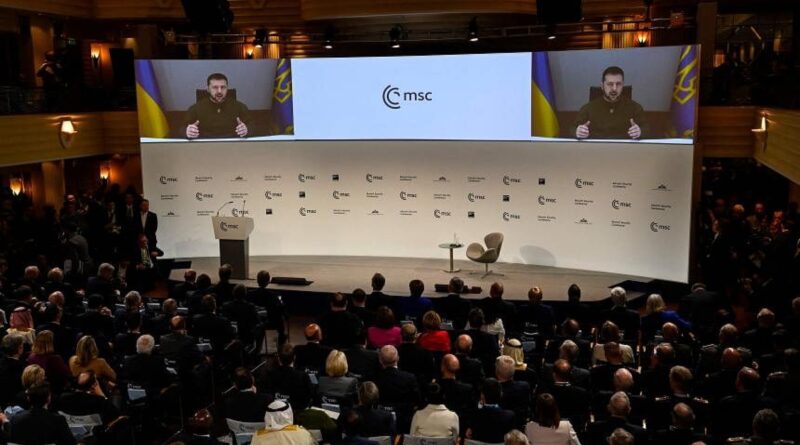Zelensky: It’s ‘obvious’ Ukraine won’t be Putin’s last stop
KYIV – Ukraine President Volodymyr Zelensky on Friday said it was “obvious” his country would not be the last stop of Russian President Vladimir Putin’s invasion, and that it was vital the West does not delay arms deliveries to help Kyiv repel Russian forces.
The Ukrainian leader told the Munich Security Conference by video link that while the West was negotiating supplies of tanks to Kyiv, the Kremlin was thinking of ways to “strangle” the former Soviet republic of Moldova, which lies west of Ukraine.
“It’s obvious that Ukraine is not going to be his last stop. He’s going to continue his movement all the way… including all the other states that at some point in time were part of the Soviet bloc,” he said.
He urged the West to maintain speedy weapons deliveries, saying: “Delay has always been and still is a mistake.”
Mr Zelensky made his opening remarks in English as he addressed the security conference, an annual gathering of leading politicians, military officers and diplomats, days before Ukraine marks the first anniversary of Russia’s full-scale invasion in 2022.
Despite his warnings, Mr Zelensky said he did not think Russia could win. He likened Ukraine to David and Russia to Goliath in the Biblical tale in which the underdog David, armed with a sling, wins.
He said David had defeated Goliath by action rather than conversation and that Goliath “has no chances”, adding: “We need the speed, speed of our agreements, speed of our delivery, to strengthen our sling – speed of decisions to limit Russian potential.”
The Munich Security Conference opened on Friday, bringing world leaders together ahead of the first anniversary of Russia’s invasion of Ukraine as Kyiv steps up pleas for more weapons.
Ties between the United States and China will also be in focus at the three-day gathering, with tensions sky-high after Washington shot down an alleged Chinese surveillance balloon over US territory.
German Chancellor Olaf Scholz and France’s President Emmanuel Macron spoke at the opening event, with a focus on Ukraine.
Mr Scholz said allies with available battle tanks should send them now to Ukraine.
“Those who can send such battle tanks should really do so now,” Mr Scholz told the conference, adding that he would be “intensively campaigning” for allies to move on the issue. His call marked a dramatic reversal, as he had for months been under pressure from allies to approve the delivery of German-made Leopard tanks to Ukraine.
Germany finally relented in January, saying it would itself send a company of 14 Leopard 2 A6 tanks, with the aim of assembling along with allies, two tank battalions for Ukraine.
But subsequent talks with Nato partners struggled to make up the numbers for a full battalion of the more modern A6 tanks.
On Wednesday, German Defence Minister Boris Pistorius admitted that allies had only mustered “half a battalion” of A6s so far – including the 14 from Germany itself and three from Portugal.
Another battalion would be made up of older A4 tanks, with Poland as the main contributor.
In Munich, Mr Scholz said Germany remains Ukraine’s biggest military supporter in continental Europe, and that Berlin will “contribute to help our partners make this decision, for example by training Ukrainian soldiers here in Germany or by supporting them with logistics and supplies”.
Talks are on with the Netherlands, but Berlin is opposed to the Dutch sending the 14 A6s because that would “weaken the operational readiness” of a joint German-Dutch brigade where they are used.
Mr Macron also urged allies to intensify their military support for Ukraine to help the country carry out a needed counter-offensive against Russia, saying: “It is not the time for dialogue because we have a Russia which has chosen war, which has chosen to intensify the war, and which has chosen to go as far as committing war crimes and to attacking civilian infrastructures.” REUTERS, AFP

